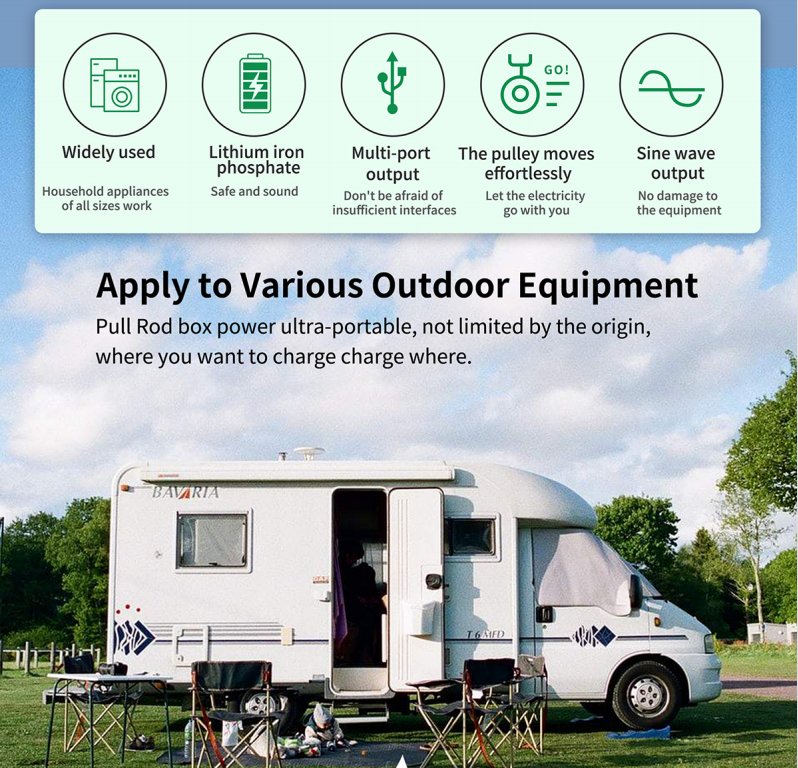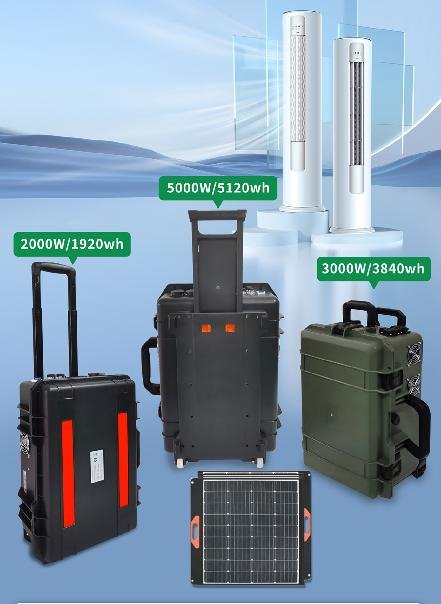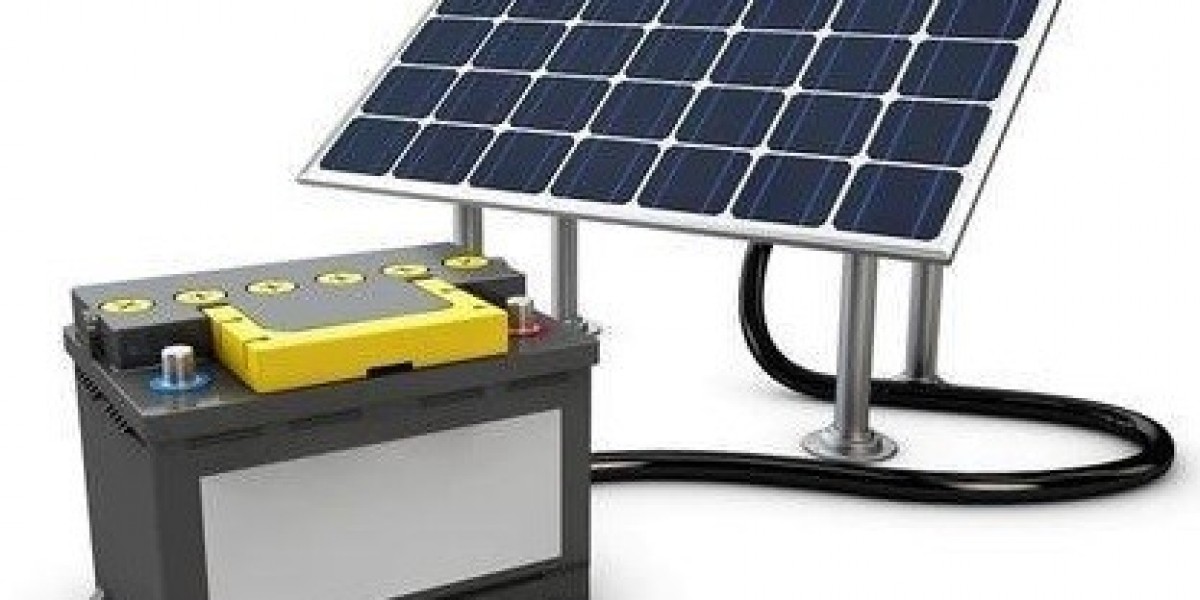Are you looking for a way to power your devices and appliances when you are camping in remote areas? Do you want to enjoy the benefits of clean, renewable, and reliable energy without relying on fossil fuels or noisy generators? If so, you might want to consider getting a solar generator for camping.
A solar generator is a device that converts solar energy into electrical power that you can use to run your lights, fans, laptops, TVs, and more. It is a great alternative to traditional gas generators, as it does not emit any harmful gases or noise, and it can save you money on fuel and maintenance costs in the long run.
However, not all solar generators are created equal. There are many factors that you need to consider when buying a solar generator for camping, such as power output, power capacity, charging speed, portability, durability, compatibility, and cost. In this guide, we will help you understand what a solar generator is, how it works, why you need it, and how to choose the best one for your camping needs. We will also compare of the best solar generators for camping in 2024 and give you some tips on how to use and maintain them. By the end of this guide, you will be able to make an informed decision and enjoy the convenience and comfort of having a solar generator for camping.

What is a Solar Generator and How Does It Work?
A solar generator is a device that converts solar energy into electrical power that you can use to power your devices and appliances. It consists of three main components: solar panels, battery, and inverter.
- Solar panels are the devices that capture sunlight and convert it into direct current (DC) electricity. They are usually made of silicon cells that generate electricity when exposed to light. The amount of electricity that solar panels can produce depends on the size, quality, and efficiency of the panels, as well as the amount and intensity of sunlight that they receive.
- Battery is the device that stores the DC electricity that the solar panels produce for later use. It is usually a rechargeable lithium-ion battery that can hold a certain amount of electricity, measured in watt-hours (Wh). The battery is the most important component of a solar generator, as it determines how much power you can use and for how long. The battery also protects the solar generator from overcharging and over-discharging, which can damage the system.
- Inverter is the device that converts the DC electricity that the battery stores into alternating current (AC) electricity that most appliances and devices use. It is usually a device that plugs into the solar generator and has one or more outlets that you can connect your devices and appliances to. The inverter also regulates the voltage and frequency of the AC electricity to match the standards of your devices and appliances. The inverter determines how much power you can use at a given time, measured in watts (W).
The solar generator works by following these steps:
- The solar panels capture sunlight and convert it into DC electricity.
- The DC electricity flows from the solar panels to the solar generator, where it is stored in the battery.
- When you need to use power, you plug your devices and appliances into the inverter, which converts the DC electricity from the battery into AC electricity that your devices and appliances can use.
- The battery level decreases as you use power, and increases as the solar panels recharge it.
The solar generator can also be charged from other sources besides solar panels, such as wall outlets, car chargers, or wind turbines. This can help you extend the battery life and increase the power output of your solar generator.
Why Do You Need a Solar Generator for Camping?
A solar generator can provide you with many benefits when you are camping in remote areas, such as:
- Eco-friendly: A solar generator does not emit any harmful gases or noise that can pollute the environment or disturb the wildlife. It also reduces your dependence on fossil fuels, which are non-renewable and contribute to global warming and climate change. By using a solar generator, you can enjoy the beauty of nature while protecting it at the same time.
- Economical: A solar generator can save you money on fuel and maintenance costs in the long run. Unlike gas generators, which require you to buy and transport fuel, and to perform regular maintenance and repairs, solar generators only require you to buy and install the system once, and then enjoy free and unlimited power from the sun. The initial cost of a solar generator may be higher than a gas generator, but the long-term savings can outweigh the difference.
- Reliable: A solar generator can provide you with consistent and uninterrupted power as long as there is sunlight. You do not have to worry about running out of fuel, finding a gas station, or dealing with power outages. As long as you have enough battery capacity and solar panels, you can have power whenever and wherever you need it.
- Versatile: A solar generator can power a variety of devices and appliances, from lights and fans to laptops and TVs. You can choose a solar generator that matches your power needs and preferences, and customize it with accessories and components that suit your camping style. You can also use a solar generator for other purposes besides camping, such as emergency preparedness, backup power, and off-grid living.
What Factors Should You Consider When Buying a Solar Generator for Camping?
When you are shopping for a solar generator for camping, there are many factors that you need to consider to find the best one for your needs. Here are some of the most important ones:
- Power output: This is the amount of electricity that the solar generator can produce and supply at a given time, measured in watts (W). The power output determines what kind of devices and appliances you can power with the solar generator, and how many of them you can power simultaneously. The higher the power output, the more powerful the solar generator is. However, higher power output also means higher cost and weight. You should choose a solar generator that has enough power output to meet your camping needs, but not more than you need, as that would be wasteful and inefficient.
- Power capacity: This is the amount of electricity that the solar generator can store and deliver over time, measured in watt-hours (Wh). The power capacity determines how long you can use the solar generator before it runs out of power, and how often you need to recharge it. The higher the power capacity, the longer the solar generator can last. However, higher power capacity also means higher cost and weight. You should choose a solar generator that has enough power capacity to last for your camping duration, but not more than you need, as that would be unnecessary and bulky.
- Charging speed: This is the rate at which the solar generator can recharge its battery from solar panels or other sources, measured in watts (W) or hours (h). The charging speed determines how fast you can restore the power level of the solar generator after using it, and how much sunlight you need to do so. The faster the charging speed, the more convenient the solar generator is. However, faster charging speed also means higher cost and more solar panels. You should choose a solar generator that has a reasonable charging speed that matches your camping schedule and location, but not faster than you need, as that would be expensive and excessive.
- Portability: This is the ease of transporting and setting up the solar generator, measured in weight (lbs or kg), size (inches or cm), and design. The portability determines how much space and effort you need to pack and carry the solar generator, and how quickly and easily you can deploy and use it. The more portable the solar generator is, the more user-friendly it is. However, more portability also means lower power output and capacity. You should choose a solar generator that is as portable as possible, but not at the expense of performance and functionality.
- Durability: This is the ability of the solar generator to withstand harsh weather and environmental conditions, such as rain, snow, wind, dust, and heat. The durability determines how long the solar generator can last and how well it can perform under different circumstances. The more durable the solar generator is, the more reliable it is. However, more durability also means higher cost and weight. You should choose a solar generator that is durable enough to handle the camping conditions that you expect to encounter, but not more than you need, as that would be overkill and heavy.
- Compatibility: This is the degree of matching between the solar generator and your devices and appliances, in terms of voltage, frequency, plug type, and wattage. The compatibility determines how easily and safely you can connect and use your devices and appliances with the solar generator, and how efficiently the solar generator can power them. The more compatible the solar generator is, the more versatile it is. However, more compatibility also means higher cost and complexity. You should choose a solar generator that is compatible with most of your devices and appliances, but not more than you need, as that would be unnecessary and complicated.
- Cost: This is the amount of money that you need to pay to buy and use the solar generator, including the initial purchase price, the accessories and components, the shipping and installation fees, and the operating and maintenance costs. The cost determines how affordable and worthwhile the solar generator is, and how much value it can provide for your money. The lower the cost, the more economical the solar generator is. However, lower cost also means lower quality and performance. You should choose a solar generator that has a reasonable cost that fits your budget and expectations, but not lower than you need, as that would be cheap and ineffective.
How to Compare Different Solar Generators for Camping?
Once you have a clear idea of what factors you need to consider when buying a solar generator for camping, you can start comparing different solar generators based on these factors. Here are some tips on how to compare different solar generators for camping:
- Compare the specifications and features of different solar generators based on the factors mentioned above. You can find the specifications and features of different solar generators on their websites, manuals, or product pages. You can also use online tools or calculators to compare different solar generators based on their power output, capacity, charging speed, portability, durability, compatibility, and cost.
- Compare the reviews and ratings of different solar generators from customers and experts. You can find the reviews and ratings of different solar generators on online platforms, such as Amazon, YouTube, blogs, forums, or social media. You can also ask for recommendations or opinions from other campers, friends, or family who have used or own solar generators. You can learn from the experiences and feedback of other users and get a better sense of the strengths and weaknesses of different solar generators.
- Compare the pros and cons of different solar generators and weigh them against your needs and preferences. You can make a list of the pros and cons of different solar generators based on the factors mentioned above, and rank them according to their importance and relevance to you. You can also assign scores or ratings to different solar generators based on their pros and cons, and calculate their overall scores or ratings. You can then compare the scores or ratings of different solar generators and see which one has the highest score or rating, or the best balance of pros and cons.
- Compare the warranties and customer service of different solar generator brands and sellers. You can find the warranties and customer service of different solar generator brands and sellers on their websites, manuals, or product pages. You can also contact them directly via phone, email, or chat to ask questions or request assistance. You can evaluate the warranties and customer service of different solar generator brands and sellers based on their coverage, duration, terms, conditions, exclusions, and responsiveness. You can then compare the warranties and customer service of different solar generator brands and sellers and see which one offers the best protection and support for your solar generator.
How to Use and Maintain a Solar Generator for Camping?
After you have bought a solar generator for camping, you need to know how to use and maintain it properly to get the most out of it. Here are some tips on how to use and maintain a solar generator for camping:
- Follow the instructions and safety precautions provided by the solar generator manufacturer and seller. You should read the manual carefully and follow the guidelines on how to set up, operate, and store the solar generator. You should also pay attention to the safety warnings and avoid doing anything that could damage the solar generator or cause injury to yourself or others.
- Place the solar panels in a sunny and unobstructed location and angle them towards the sun. You should find a spot that receives the most sunlight throughout the day and has no shade or obstruction from trees, buildings, or other objects. You should also adjust the angle of the solar panels according to the season and the time of the day to maximize the solar exposure and the power generation. You can use a solar panel tilt calculator or a smartphone app to help you find the optimal angle for your location and date.
- Connect the solar panels to the solar generator and the solar generator to your devices and appliances. You should use the cables and connectors that come with the solar generator or are compatible with it. You should also make sure that the connections are secure and tight, and that there is no water or dirt on the plugs or sockets. You should also check the voltage, frequency, plug type, and wattage of your devices and appliances, and make sure that they match the specifications and standards of the solar generator. You should avoid overloading the solar generator or using devices and appliances that require more power than the solar generator can provide.
- Monitor the battery level and power output of the solar generator and adjust accordingly. You should keep an eye on the display or indicator of the solar generator, which shows you the battery level, the power output, the charging status, and other information. You should also use a power meter or a wattage calculator to measure the power consumption of your devices and appliances. You should try to balance the power input and output of the solar generator, and avoid draining the battery too low or wasting the excess power. You should also conserve power by turning off or unplugging the devices and appliances that you are not using, and by using energy-efficient or low-wattage devices and appliances whenever possible.
- Keep the solar generator and the solar panels clean and dry and protect them from dust, dirt, and moisture. You should wipe the solar generator and the solar panels with a soft cloth or a brush regularly to remove any dust, dirt, or debris that could affect their performance or efficiency. You should also avoid exposing the solar generator and the solar panels to water, rain, snow, or humidity, as they could cause corrosion, short-circuit, or fire. You should cover the solar generator and the solar panels with a waterproof or weatherproof cover or case when not in use or when the weather is bad.
- Store the solar generator and the solar panels in a cool and ventilated place when not in use. You should find a place that has a stable and moderate temperature and humidity, and that is away from direct sunlight, heat sources, or flammable materials. You should also avoid storing the solar generator and the solar panels in a place that is too cold or too hot, as that could damage the battery or the solar cells. You should also make sure that the solar generator and the solar panels are fully charged before storing them, and that you recharge them at least once every three months to prevent the battery from losing its capacity or performance.
What are the Benefits and Drawbacks of a Solar Generator for Camping?
A solar generator for camping can offer you many benefits, but it also has some drawbacks that you need to be aware of. Here are some of the benefits and drawbacks of a solar generator for camping:
- Benefits:
- Eco-friendly: A solar generator does not emit any harmful gases or noise that can pollute the environment or disturb the wildlife. It also reduces your dependence on fossil fuels, which are non-renewable and contribute to global warming and climate change. By using a solar generator, you can enjoy the beauty of nature while protecting it at the same time.
- Economical: A solar generator can save you money on fuel and maintenance costs in the long run. Unlike gas generators, which require you to buy and transport fuel, and to perform regular maintenance and repairs, solar generators only require you to buy and install the system once, and then enjoy free and unlimited power from the sun. The initial cost of a solar generator may be higher than a gas generator, but the long-term savings can outweigh the difference.
- Reliable: A solar generator can provide you with consistent and uninterrupted power as long as there is sunlight. You do not have to worry about running out of fuel, finding a gas station, or dealing with power outages. As long as you have enough battery capacity and solar panels, you can have power whenever and wherever you need it.
- Versatile: A solar generator can power a variety of devices and appliances, from lights and fans to laptops and TVs. You can choose a solar generator that matches your power needs and preferences, and customize it with accessories and components that suit your camping style. You can also use a solar generator for other purposes besides camping, such as emergency preparedness, backup power, and off-grid living.
- Drawbacks:
- Expensive: A solar generator can have a high initial cost and may require additional accessories and components, such as solar panels, cables, connectors, cases, and covers. You may also need to pay for shipping and installation fees, depending on where you buy and how you set up the solar generator. You may also need to consider the opportunity cost of investing in a solar generator, which could be used for other things.
- Heavy: A solar generator can be bulky and heavy, especially if it has a large battery capacity and power output. You may need a vehicle or a cart to transport the solar generator, and you may have limited space and weight allowance for your other camping gear and supplies. You may also need to spend more time and effort to set up and pack up the solar generator, and to find a suitable location and angle for the solar panels.
- Limited: A solar generator can have a limited power output and capacity, and may not be able to power large or high-wattage appliances, such as air conditioners, heaters, refrigerators, or microwaves. You may need to compromise on the comfort and convenience of your camping experience, and to prioritize the essential and low-wattage devices and appliances. You may also need to ration the power usage and to recharge the solar generator frequently, depending on your power consumption and the solar availability.
- Dependent: A solar generator can be dependent on the weather and the season, and may not work well in cloudy or rainy days, or in winter or autumn. You may need to adjust your camping schedule and location to match the solar conditions, and to have backup or alternative power sources, such as wall outlets, car chargers, or wind turbines. You may also need to monitor the weather forecast and the solar generator status closely, and to be prepared for any changes or emergencies.
What are the Best Solar Generators for Camping in 2024?
Based on our research and analysis, here are some of the best solar generators for camping in 2024, along with their specifications, features, pros, and cons:
- Trolley Box Type Outdoor Portable Power Station 2000/3000/5000w: This is a powerful and portable solar generator that has a 1000W output and a 1002Wh capacity. It can power up to seven devices at the same time, including laptops, TVs, mini-fridges, and CPAP machines. It can be recharged from solar panels, wall outlets, or car chargers in about eight hours. It weighs 22 lbs and has a handle and a LCD screen. It also has multiple safety features, such as over-voltage, over-current, and short-circuit protection. - Pros: - High power output and capacity - Multiple charging and output ports - Fast and flexible charging options - Portable and user-friendly design - Safe and reliable performance
- Cons:
- Expensive and heavy
- Solar panels sold separately
- May not work well in cold weather
- Cons:









